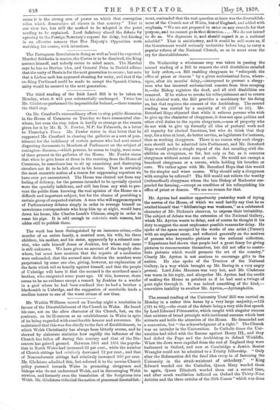On Wednesday a wholesome step was taken in passing the
second reading of a Bill to remove the civil disabilities entailed by holy orders,—a Bill enabling clergymen to "relinquish the office of priest or deacon" by a given ecclesiastical form, where- upon, after six months' delay,—interposed to prevent a clergy- man who has incurred ecclesiastical censure from thus escaping it,—the Bishop registers the deed, and all civil disabilities are removed. If he wishes to revoke his relinquishment and to return to his clerical work, the Bill provides a machinery for his doing so, but that requires the consent of the Archbishop. The second reading was carried by a majority of 81 (137 to 56). Mr. Beresford Hope objected that while it relieves persons who wish to give up the character of clergymen, it does not open politics and other civil duties to the squire clergymen,—men of property who do not wish to give up formally all idea of pastoral work and all capacity for clerical functions, but who do think that they may, for a time at least, do better service, as legislators for instance, than as working clergymen. There is no reason why such clergy- men should not be admitted into Parliament, and Mr. Beresford Hope would prefer a simple repeal of the Act entailing civil dis- abilities on clergymen, so far, but only so far, as it concerns clergymen without actual cure of souls. He would not exempt a beneficed clergyman or a curate, while holding his benefice or cure. We rather agree with Mr. Beresford Hope that this would be the simpler and wiser course. Why should only a clergyman with scruples be relieved? The Bill would not relieve the worthy (unbeneficed) clergyman whom the late Bishop of Rochester sus- pended for farming,—except on condition of his relinquishing his office of priest or deacon. We see no reason for that.






























 Previous page
Previous page